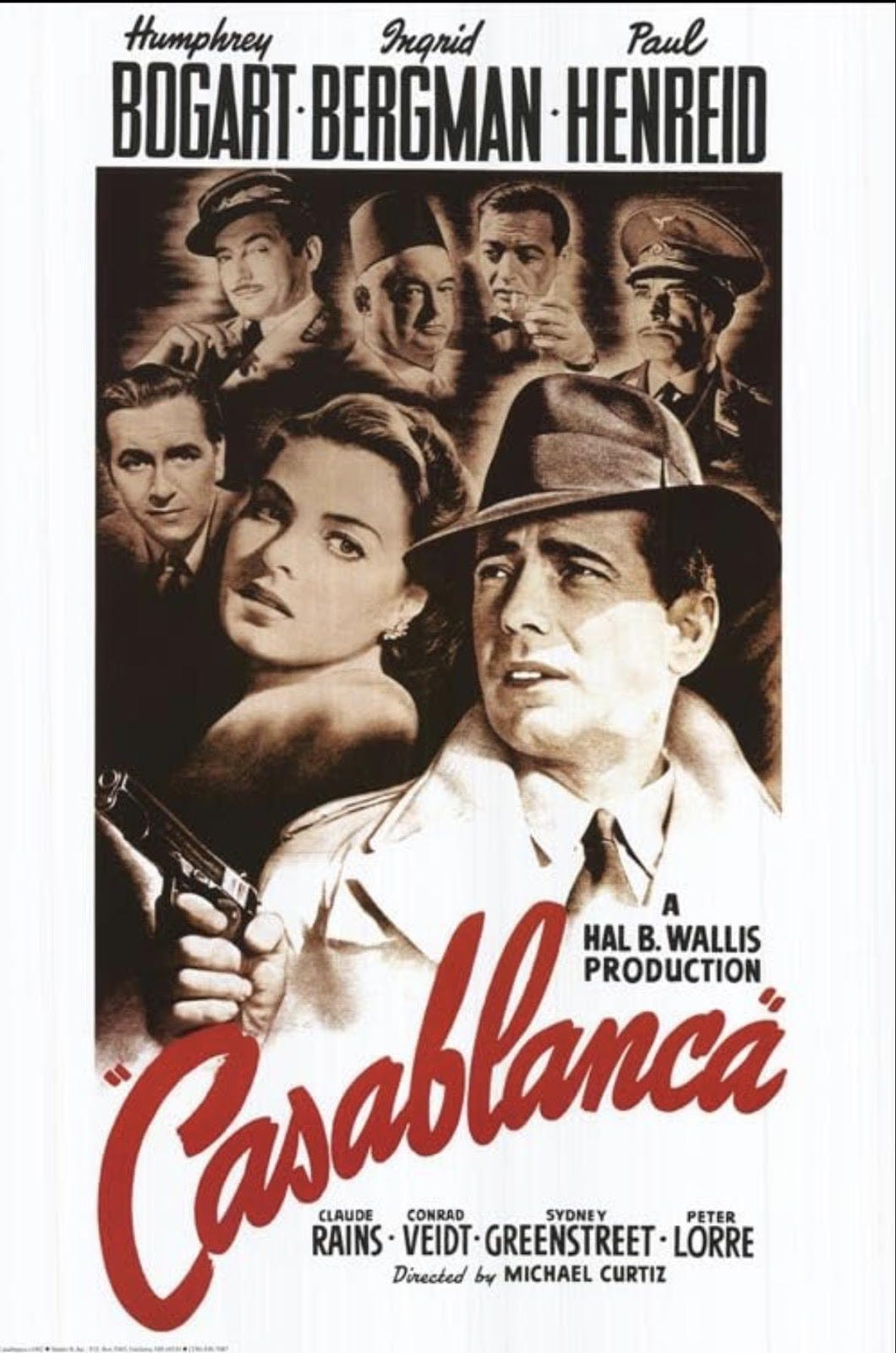Episode 1: Casablanca (1942)
Welcome to Classics Weekly, our first episode.
We’ve done 300 episodes of our horror-movie podcast (horrorweekly.com), watching and reviewing five or six films each week along with a sprinkling of shorts. We love our horror, but we like other things too. What to do? We have noticed over the past six years that we both seem to really enjoy the older films– the Universal and Hammer monster films are considered classics for a reason. Maybe we could do something with older NON-horror movies? How about watching those old, highly-regarded classics that we’ve either never seen or haven’t seen in decades? That sounded like a winner of an idea for us!
Rather than go for quantity, as we did for the horror films, this time around, we’re taking it slower and going to more depth in our reviews of a single film each week. Will that number grow? Perhaps, but not right away. Other than limiting ourselves to one film each week, the format will be very similar to our other show.
When we decided to do a podcast and newsletter about classic films and the best-regarded films of all time, one film came straight to mind, so we decided to start with “Casablanca.” Brian had seen it once before, but this was Kevin’s first time into it.
We watched the version on Amazon Prime, but it’s also available to stream in several other places. Naturally, there are DVD and BluRay editions out there as well.
Just as with “Horror Weekly,” we’re releasing this project as both a weekly podcast and a weekly email newsletter. To subscribe to one or both versions, go to https://www.classicsweekly.com
1942 Casablanca
Directed by Michael Curtiz
Written by Julius J. Epstein, Howard Koch, Murray Burnett
Stars Humphrey Bogart, Ingrid Bergman, Paul Henreid, Claude Rains, Conrad Veidt, Peter Lorre
Run Time: 1 Hour, 42 Minutes
Spoiler-Free Judgment Zone
This is a World War 2 movie that only has it in the background. It’s interesting to think there were all kinds of places in the world that were affected by the war, and lots of people who were, without witnessing combat or destruction. There is plenty of drama and romance in this film, and it’s a gem of a movie. The story, direction, and script still hold up after all these years. The special effects such as background paintings and models are fairly obvious to modern viewing eyes, but it’s so good overall that it’s forgivable, and actually kind of an interesting view of how they made movies in those days with what they had available.
Awful One Sentence Synopsis
A bunch of people fight over exit visas.
Spoilery Synopsis
It’s December, 1941. We are told that the second world war has created a refugee trail that runs through Europe down into Africa all the way to Casablanca in French Morocco, where the lucky people can escape to America; the unlucky people are stuck there.
Two German couriers have been murdered, and the police have been ordered to round up all suspicious characters. All the white men in suits and hats are arrested - talk about not blending into the local populace. One man runs from the police and is shot. It’s not a fun place, and everyone wants to leave, but it’s not that simple.
Major Strasser, a German officer, lands his plane and is welcomed by Captain Renault, a French officer. They talk about Rick’s, a popular, classy nightclub.
At Ricks, people make plans to get out of the city, and it’s very expensive. One woman tries to trade a diamond necklace for passage, but it isn’t enough. Rick doesn’t want to serve a German banker, and Ugarte comments on Rick’s willpower. Rick doesn’t like Ugarte since he really gouges on travel prices and fake visas. Ugarte gives his impeccable travel papers to Rick for safekeeping. Those letters may have come from the murdered German couriers. Rick hides the papers inside Sam’s piano.
Signor Ferrari comes in, and he wants to buy Rick’s bar. Rick doesn’t want to sell. Yvonne wants to know when she’ll see Rick again. She’s drunk, and Rick sends her home. Rick stops to talk to Renault. Renault wants to know why Rick doesn’t want to go home to America. He explains that they are going to arrest a murderer in the club tonight. Renault knows all kinds of unsavory things happen in this club, but Rick isn’t involved in that. He warns that the problematic dissident Victor Laszlo is not, under any circumstances, to get one of those exit visas.
The police close in on Ugarte, who starts blasting. The police grab him and carry him away. Rick sits at Major Strasser’s table. Strasser wants to know Rick’s loyalties, but Rick seems pretty neutral; he didn’t used to be neutral. He cannot return home, but Strasser wants to know why. He wants to be sure that Rick won’t assist Victor Laszlo.
Laszlo comes in and gets a table with Ilsa Lund. A man, Berger, shows them a signal, but Renault interrupts to introduce himself. Afterwards, Berger tells Laszlo about a meeting tomorrow night.
Ilsa talks to Sam, the piano player, about Rick. He says she’s bad luck for Rick. She wants him to “Play it,” and he pretends not to know what song she means. He finally goes along and sings “As Time Goes By.” Rick hears the song and knows she’s there; they have a history. Rick, Ilsa, Laszlo, and Renault sit down together.
After closing, Rick gets drunk. Sam tells him that Ilsa’s not coming for Rick. Rick orders Sam to play the song again; it’s a “thing” he and Ilsa had before the Germans invaded Paris. We get a flashback to happier times as the smiling couple enjoyed the French countryside, clearly in love. Then, the Germans invaded, and Rick had to run due to his record. He suggests they get married on the train out, but she’s evasive; she knows she can’t go with him but doesn’t say so. Rick and Sam get to the train station, but Ilsa sends a note saying she can’t come.
Back in the present, Ilsa does come to see Rick at the bar that night. She says she didn’t know he was in Casablanca. He accuses her of leaving him for another man, and she storms out in anger.
Laszlo meets with Strasser, who denies any possibility of a visa. Renault backs him up. Strasser wants the names of the leaders of the Underground from Laszlo in exchange for a visa. There are many veiled and not-so-veiled threats.
Rick goes to the Blue Parrot, Signor Ferrari’s club. They talk about the death of Ugarte and those letters of transit. Ferrari wants those letters, and he thinks Rick has them. Rick tracks down Ilsa, who says that Laszlo is her husband and has been all along. Ferrari says he can get a visa for Ilsa, but there’s no way he can help Laszlo. She says she won’t leave him. Ferrari tells Laszlo that he believes Rick has Ugarte’s letters of transit.
Renault clarifies that his loyalties are either with the Germans or against them, depending on which way the wind blows, although he has an understanding with Rick. Captain Renault sends a young girl and her husband to Rick to buy an exit visa. He says he won’t help but then tells the woman’s husband how to win at roulette– twice in a row. Laszlo comes to Rick and pleads his case for a special visa. Rick says there’s no amount of money that would entice him to help Laszlo, and Laszlo should ask his wife why.
All this drama seems to culminate in a “battle of the bands” between the Germans and the French. The crowd is predominantly on the French side, so the Germans aren’t happy. Strasser orders Renault to close the place down and then threatens to kill Laszlo.
Laszlo tells Ilsa that Rick won’t sell him the visas and why. He knows that she was with Rick while he was in the concentration camp. When he leaves to attend a meeting of the Underground, she sneaks out to talk to Rick. Rick swears that he’s not fighting for her cause or any cause at all; he’s completely neutral. She begs first and then pulls a gun on him. He calls her bluff, and she tells him the full story about thinking her husband had died in the concentration camp. She offers to stay with Rick if he helps Laszlo safely leave the country.
The Germans break up the Underground meeting, and Laszlo returns to Rick’s. The two men talk, and they understand each other just fine. Laszlo wants Rick to use those letters and take Ilsa away safely. Just then, the police come in and arrest Laszlo.
Rick tells Renault that he does have those letters, and he plans to use them to leave the country with Ilsa. Rick suggests a scheme to allow Renault to arrest Laszlo for an even bigger crime in a sort of frame-up. Rick then sells his bar to Ferrari as he plans to leave.
Rick has told Ilsa what’s going on, but then Renault comes in, gun drawn, and arrests Laszlo. Then Rick pulls a gun on Renault; he’s changed his mind. Renault makes a phone call, saying he’s letting the airport know to get ready, but he’s actually called Strasser to warn him what’s happening. Night falls, and all the characters converge at the airport. When it’s time to fill in the names on the papers, Rick tells Renault that it will be for Laszlo and Ilsa. He wants them both to leave and continue their work with the Underground. Rick and Ilsa have an emotional departure talk, and Rick tells Laszlo that Ilsa was just using him to help Laszlo and anything between her and Rick is in the past.
Ilsa and Laszlo board the plane and fly away to freedom, leaving Rick and Renault to deal with Strasser. Rick ends up shooting Major Strasser. Renault orders his men to “round up the usual suspects,” letting Rick off the hook. Renault does mention it might be a good idea for Rick to leave Casablanca for a while, and they walk away together with Rick commenting that this could be the start of a beautiful friendship.
Brian’s Commentary
The entire main cast either were, or went on to be, major stars of the time. Claude Rains, as Renault, is corrupt, admits it, and even makes jokes about it (he’s the stand-out favorite in my opinion). Veidt, an actual German, plays a stereotypical German Officer, polite but also smarmy and creepy; he was also the highest-paid actor of the film. Bogart plays it mostly emotionlessly neutral, but you know there’s more going on inside. Ingrid Bergman was two inches taller than Humphrey Bogart, so he had to stand on a box during their scenes together.
Everyone knows the situation, and everyone knows what’s going to happen, but no one can really act due to the political situation. This makes everything very tense and serious. The plot is dense and very intertwined with the politics of the time, but it all still makes sense today if you know a little history.
The film is full of quotable lines that we still hear regularly today. The film has been parodied, copied, homaged, referenced, and outright stolen from in hundreds of films, shows, and other media.
It was nominated for eight Academy Awards and won three, for “Outstanding Motion Picture,” “Best Director,” and “Best Screenplay,”
This film was cranked out like hundreds of others at the time. It had some well-known stars, but no one expected it to be a hit or even more than just a little successful. It got good reviews and won at the box office, possibly because it was set during the war, which was still taking place, with the future up for grabs. Today, it’s widely regarded as one of the greatest films of all time. Check any “Top 100” list, and it’ll be on there somewhere.
Kevin’s Commentary
This movie was like real people showed up to tell the story, not actors. All the main folks are natural in their parts. I’d seen clips before, and spoofs of some scenes - like Kermit and Miss Piggy recreating the departure scene at the end while getting blown away by the wind from the propellers, but I’d never seen the whole thing all the way through. And it’s now proven to me that the iconic “Play it again, Sam,” line is never actually said in the movie. I thoroughly enjoyed it and agree that it’s considered a classic for good reason.
Contact Info:
Email: mailto:email@horrorguys.com
Book Store: https://horrormonthly.com/
Website: https://www.horrorguys.com and https://www.horrorweekly.com/
Subscribe by email: https://www.horrorweekly.com/
Facebook: https://www.facebook.com/horrormovieguys
Mastodon: https://mastodon.social/@BrianSchell
Threads: https://threads.net/brian_schell
Twitter: http://twitter.com/HorrorMovieGuys
Theme song, "Boogie Party" Kevin MacLeod (incompetech.com) Licensed under Creative Commons: By Attribution 4.0 License http://creativecommons.org/licenses/by/4.0/










